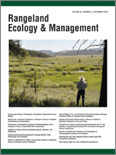
Rangeland Ecology & Management
Scope & Guideline
Innovating Solutions for Sustainable Rangeland Practices
Introduction
Aims and Scopes
- Rangeland Ecology and Biodiversity:
The journal focuses on the ecological dynamics of rangeland ecosystems, investigating biodiversity, species interactions, and the effects of grazing and land management practices on plant and animal communities. - Grazing Management and Animal Production:
It emphasizes research on grazing management strategies, livestock production efficiency, and the interactions between herbivores and rangeland health. - Remote Sensing and Landscape Assessment:
A significant portion of the research utilizes remote sensing technologies to assess landscape conditions, vegetation cover, and changes in land use, providing critical data for managing rangelands. - Sustainable Practices and Restoration Techniques:
The journal promotes studies on sustainable rangeland practices, restoration techniques for degraded areas, and the impacts of various management strategies on ecosystem resilience. - Climate Change and Environmental Challenges:
Research addressing the impacts of climate change on rangeland ecosystems, including drought resilience, changing precipitation patterns, and adaptive management strategies, is a core focus.
Trending and Emerging
- Integration of Technology in Rangeland Management:
The use of technologies such as remote sensing, GPS tracking, and machine learning for monitoring and managing rangeland ecosystems is increasingly prominent, indicating a shift towards data-driven management practices. - Holistic and Adaptive Management Approaches:
There is a growing emphasis on holistic management frameworks that incorporate ecological, social, and economic factors, promoting adaptive strategies that enhance resilience in rangeland systems. - Climate Resilience and Adaptation Strategies:
Research on climate adaptation strategies is on the rise, focusing on how rangeland management can mitigate the impacts of climate change and enhance ecosystem resilience. - Socioeconomic Dimensions of Rangeland Management:
An increasing number of studies are exploring the socioeconomic aspects of rangeland management, including community involvement, stakeholder perspectives, and the economic viability of sustainable practices. - Wildfire Management and Fuel Reduction Techniques:
With the increasing frequency of wildfires, there is a notable trend towards research on effective wildfire management practices, including the use of targeted grazing and prescribed burning as fuel reduction strategies.
Declining or Waning
- Traditional Grazing Practices:
Research on conventional grazing methods has seen a decrease as more studies shift towards innovative and adaptive grazing strategies that emphasize sustainability and ecosystem health. - Invasive Species Management:
While still relevant, the focus on invasive species management has waned as attention moves towards integrated approaches that consider biodiversity and ecological resilience rather than solely eradication. - Single-Species Focus:
There is a noticeable decline in studies concentrating on single species management. The trend is moving towards holistic approaches that consider community dynamics and ecosystem interactions.
Similar Journals
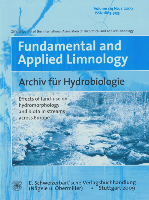
Fundamental and Applied Limnology
Navigating Freshwater Science: From Fundamental Studies to Practical SolutionsFundamental and Applied Limnology is an esteemed academic journal dedicated to the exploration of freshwater ecosystems, bridging the gap between fundamental research and practical applications. Published by E Schweizerbart'sche Verlagsbuchhandlung in Germany, this journal has been a vital resource in the fields of aquatic science and ecology since its inception in 2007. With its ISSN 1863-9135 and E-ISSN 1863-9135, it provides a platform for researchers to disseminate significant findings related to limnology, contributing to a rich understanding of freshwater biodiversity, water quality, and ecological interactions. Although currently rated in the Q3 quartile for aquatic sciences and ecology as per the 2023 rankings, it remains a valuable outlet for interdisciplinary research and practical insights, facilitating critical advancements in environmental management. Open access options enhance its visibility and accessibility, making it indispensable for researchers, professionals, and students alike who are committed to advancing the scholarship in freshwater studies. Engaging with this journal not only opens doors to the latest research findings but also fosters collaboration and innovation in the ecological community.

FOREST SCIENCE
Exploring innovative solutions for ecological challenges.FOREST SCIENCE, published by Oxford University Press Inc, is a pivotal journal in the field of forestry and ecological modeling, boasting an impressive track record since its inception in 1970. With an ISSN of 0015-749X and E-ISSN 1938-3738, the journal provides a valuable platform for the dissemination of high-quality research and studies that address contemporary challenges in forestry and ecology. It ranks in the Q2 category for both ecology and forestry and holds a Q3 ranking in ecological modeling according to the latest evaluations, illustrating its significant contribution to these fields. The journal is accessible through various options, facilitating broad readership and engagement within the academic community. As part of its commitment to advancing knowledge and practices in forest management and conservation, FOREST SCIENCE seeks to bridge theoretical research with practical applications, making it an indispensable resource for researchers, professionals, and students alike.
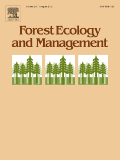
FOREST ECOLOGY AND MANAGEMENT
Fostering Sustainable Solutions for Global ForestsFOREST ECOLOGY AND MANAGEMENT is a premier peer-reviewed journal dedicated to the integral study of forest ecosystems and their management, published by Elsevier in the Netherlands. With an impactful presence in the field, this journal boasts a prestigious Q1 ranking in multiple categories, including Forestry, Management, Monitoring, Policy and Law, and Nature and Landscape Conservation as of 2023. It addresses key issues relevant to sustainable forest practices, conservation strategies, and environmental monitoring, making it a vital resource for researchers, practitioners, and policymakers alike. The journal is indexed with an impressive Scopus rank, placing it among the top tier of titles in Agricultural and Biological Sciences and Environmental Science. While it does not offer Open Access options, its rigorous review process and high visibility make it essential for those seeking to stay abreast of the latest findings and trends in forest ecology and management. Published continuously since 1976, FOREST ECOLOGY AND MANAGEMENT aims to foster interdisciplinary collaboration and advance knowledge critical to the stewardship of forest resources in an ever-changing global landscape.
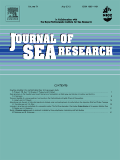
JOURNAL OF SEA RESEARCH
Connecting Science and Sustainability Beneath the WavesJOURNAL OF SEA RESEARCH, published by Elsevier, is a premier academic journal dedicated to advancing knowledge in the fields of aquatic science, ecology, and oceanography. Since its inception in 1996, this journal has provided a vital platform for researchers and professionals to disseminate groundbreaking findings and promote fostering interdisciplinary discussions. With its impressive Q2 ranking in multiple categories, including Aquatic Science and Ecology, Evolution, Behavior and Systematics, it positions itself as a significant contributor to marine and environmental studies. The journal is accessible in both print (ISSN: 1385-1101) and online formats (E-ISSN: 1873-1414), ensuring wide reach and engagement within the scholarly community. Researchers and students alike will find the journal not only a reliable source of information but also a source of inspiration for future explorations. With a commitment to quality and a broad scope that spans fundamental to applied research, JOURNAL OF SEA RESEARCH remains an indispensable resource for understanding the complexities of marine environments and their relevance to our changing world.

Frontiers in Forests and Global Change
Advancing knowledge for a sustainable future.Frontiers in Forests and Global Change is a leading open-access journal dedicated to advancing research in the interdisciplinary fields of forests, ecology, and global environmental change. Published by FRONTIERS MEDIA SA in Switzerland, this journal has established itself as a vital resource for scholars in ecological and environmental science, securing a prestigious Q1 ranking in multiple categories such as Ecology and Forestry as of 2023. With its commitment to open access since 2018, Frontiers in Forests and Global Change facilitates the widespread dissemination of knowledge and fosters global collaboration among researchers, professionals, and students aiming to address pressing environmental issues. The journal's emphasis on innovative research aligns with its aim to tackle the complexities of climate change and its impact on forest ecosystems, making it an essential publication for those seeking to contribute to sustainable solutions for our planet.

Ecological Solutions and Evidence
Advancing ecological understanding through empirical evidence.Ecological Solutions and Evidence, published by WILEY, stands as a leading platform in the field of ecology, environmental science, and sustainability, with a commendable reputation starting from its inception in 2020. Operating under rigorous academic standards, this journal has achieved notable distinctions by securing a Q1 category ranking in Ecology, Management, Monitoring, Policy and Law, and Nature and Landscape Conservation, making it an invaluable resource for researchers seeking to address pressing environmental challenges. With a current impact factor reflective of its influential articles, the journal features an international scope, focusing on innovative solutions derived from empirical evidence. Accessible to a global audience, the journal encourages open discourse in the field, further supporting researchers, professionals, and students striving to foster ecological sustainability and informed policy-making. Published in the United Kingdom, it aims to bridge the gap between science and application in real-world contexts, promoting actionable insights and interdisciplinary collaboration.
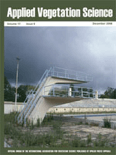
APPLIED VEGETATION SCIENCE
Empowering researchers to shape the landscape of ecology.Applied Vegetation Science is an esteemed journal published by Wiley, dedicated to advancing the field of vegetation science. With a focus on ecology and nature conservation, this journal serves as a vital resource for researchers, professionals, and policy-makers alike. It holds an impressive Q1 ranking in Ecology and Nature and Landscape Conservation, and a Q2 ranking in Management, Monitoring, Policy and Law, positioning it among the top quartiles of its field as of 2023. The journal, with its ISSN 1402-2001 and E-ISSN 1654-109X, encompasses research spanning from its inception in 1998 to 2024, making it a rich resource for trends and developments in vegetation studies. While it is not currently an open-access publication, Applied Vegetation Science continues to uphold rigorous scientific standards and provides critical insights into managing and preserving ecosystems. Its impactful contributions are reflected in its strong Scopus rankings, solidifying its reputation as a cornerstone publication for the study and management of vegetation.

Journal of Forest Research
Exploring the intricate relationship between society and forests.Welcome to the Journal of Forest Research, a pioneering publication dedicated to advancing the field of forestry and sustainable ecosystem management. Published by Taylor & Francis Ltd and boasting an impressive Q2 ranking within its category, this journal highlights significant research contributions and innovative practices in forest science. With an ISSN of 1341-6979 and E-ISSN of 1610-7403, the journal spans a fruitful history from 1996 and continues to be an influential platform up to 2024. The Scopus rank places it at an esteemed #55 out of 174 in the realm of Agricultural and Biological Sciences, reflecting its high impact within the community. While this journal is not open access, it offers targeted content for researchers, professionals, and students seeking to deepen their understanding of forest ecosystems and promote sustainable practices. Join us in exploring the intricate relationship between society and forests, and contribute to a crucial dialogue on environmental stewardship.

APPLIED ECOLOGY AND ENVIRONMENTAL RESEARCH
Exploring the vital connections between ecology and our environment.Applied Ecology and Environmental Research is a distinguished journal published by ALOKI Applied Ecological Research and Forensic Inst Ltd, located in Hungary. Since its inception in 2003, the journal has provided a pivotal platform for the dissemination of innovative research and discussions pertaining to applied ecology and its intersection with environmental sciences. With its ISSN 1589-1623 and E-ISSN 1785-0037, the journal boasts a respectable presence, achieving a Q3 ranking in Agronomy and Crop Science and a Q4 ranking in Ecology, Evolution, Behavior, and Systematics as of 2023. This reflects its commitment to publishing high-quality research that is vital for advancing knowledge in these fields. While it primarily operates under a subscription model, authors and institutions are encouraged to contribute meaningful research that sparks dialogue and fosters collaboration among a diverse range of stakeholders in ecological research. Researchers, professionals, and students alike will find valuable insights and contributions that address contemporary environmental challenges and promote sustainability. Join the community of scholars who are shaping the future of ecology and environmental research through this impactful publication.
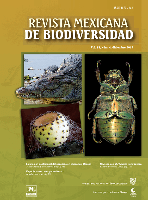
Revista Mexicana de Biodiversidad
Connecting Science and Conservation for a Thriving PlanetRevista Mexicana de Biodiversidad is a prominent academic journal dedicated to the field of biodiversity and conservation, published by the prestigious Instituto de Biología, Universidad Nacional Autónoma de México. Since its inception as an Open Access publication in 2005, it has aimed to disseminate high-quality research that advances the understanding of biological diversity in Mexico and beyond. With an ISSN of 1870-3453 and an E-ISSN of 2007-8706, the journal caters to a diverse audience, including researchers, professionals, and students, by providing vital insights into ecological studies, conservation strategies, and the sustainable management of natural resources. The journal is committed to fostering scientific collaboration and promoting the significance of biodiversity in addressing contemporary environmental challenges. By publishing innovative and impactful research, the Revista Mexicana de Biodiversidad plays an essential role in the global discourse on biodiversity conservation.